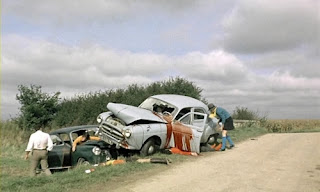“Fiercely intelligent. Cinematically sophisticated… the most disturbing film of the decade.”
-Amy Taubin, THE VILLAGE VOICE
“Stunning… A rigorous cinematic intelligence at work… harrowing, sensational.”
-Gavin Smith, FILM COMMENT
“Phenomenal! The confidence and gleeful skill of Gaspar Noe are the undeniable hallmarks of a major filmmaker in the making.”
-Andrew Johnson, TIMEOUT NY
I STAND ALONE (1998), Gaspar Noe’s first feature film, follows an embittered nameless butcher who is alone in the world. Unable to find love or a job, the butcher is willing to place blame on everyone but himself. Filled with hate, this racist, misogynist unemployed ex-con rages against the world with a short temper and death wish. Rather than shy away from this abominable character, Noe unflinchingly enters the mind of this troubled being. A sequel to CARNE (1992), Noe’s earlier short, I STAND ALONE is a cornerstone of the New Extreme in both content and form. Its characters and form of cinema can only be described as cruel.
For more information on Noe.




